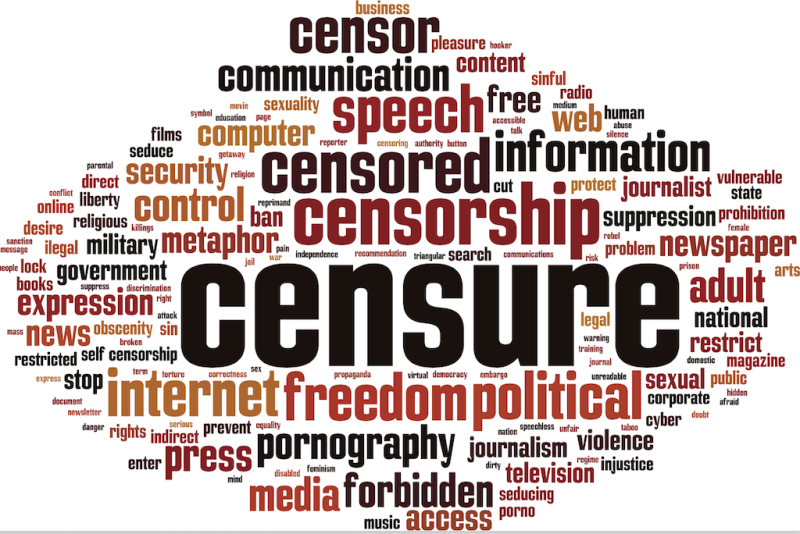
In an interview for NayaDaur, the well known Pakistani journalist and fashion designer Mohsin Sayeed has lamented that today censorship in Pakistan is worse than in Gen. Musharraf’s time.
 I have personal experience of this. Hardly any Indian newspaper publishes my articles, and no Pakistani newspaper does (earlier they used to). Probably they have been told by higer ups in both countries to avoid me like the plague (since I am very critical of the BJP in India, and have called Pakistan an artificial country). My views are published only in some brave portals like nayadaur.tv in Pakistan, and thewire.in, theweek.in and punjabtoday.in in India as well as indiacanews.com in America).
I have personal experience of this. Hardly any Indian newspaper publishes my articles, and no Pakistani newspaper does (earlier they used to). Probably they have been told by higer ups in both countries to avoid me like the plague (since I am very critical of the BJP in India, and have called Pakistan an artificial country). My views are published only in some brave portals like nayadaur.tv in Pakistan, and thewire.in, theweek.in and punjabtoday.in in India as well as indiacanews.com in America).
However, there are ways to beat the censorship, as was done in the past, and I will mention about these here so that writers in both India and Pakistan may learn.
The way to beat it is by writing not directly (for that will invite the censor) but indirectly, using allegories, allusions and suggestions; in other words by a kind of literary guerrilla warfare (in guerlla warfare one avoids a direct confrontation with a superior and more powerful enemy, but uses hit and run tactics). Here are some ways in which it has been done in the past where there was no freedom of speech and expression:
(1) Much of Urdu poetry is a protest against despotism and injustice, but this is often expressed not directly but indirectly.
For instance take Faiz’ well known sher ‘Gulon mein rang bhare baad-e-naubahaar chale, chale bhi ao ki gulshan ka kaarobaar chale ‘.
Now literally and ostensibly this means ‘Among the flowers the colorful breeze of the new spring is blowing. Come, so that the work of the garden can be done'.
But this is not what the poet is really trying to convey. As I explained earlier in my article ‘Urdu Poetry’ on my blog Satyam Bruyat, Urdu poetry often has an outer, literal, superficial meaning, and an inner, deeper meaning. In the above couplet of Faiz, what he means by the word ‘gulshan’ is not a garden but the country.
The deeper, inner, real meaning of Faiz’ sher is this:
"The objective conditions are ripe (for a revolution)
Come forward patriots, the country needs you".
Obviously at the time when Faiz wrote this poem (during the martial law regime of Gen Ayub Khan, when Faiz was in jail as an accused in the Rawalpindi conspiracy case, and could have been given a death sentence) he could not write of Revolution directly, so see how beautifully, skilfully and ingeniously he conveys his message.
Faiz's poem ‘Hum Dekhenge’ uses traditional Islamic imagery (e.g. ‘sab but uthwaaye jaayenge' ) but obviously this is a subterfuge to protect himself. Faiz was an agnostic, so obviously he is not wanting society to revert to Islamic fundamentalism, which Gen Zia was trying to do, rather it is a powerful attack on Zia’s oppressive regime.
(2) The Book of Revelations is found at the end of the New Testament in the Bible, but it is really the earliest Christian text, written probably in the 1st century A.D, when Christianity was a persecuted religion. It was dangerous then to propagate Christianity directly, so the author writes allegorically and figuratively, as if relating a dream.
(3) To avoid persecution great writers have often written fiction e.g. Jonathan Swift’s ‘Gulliver’s Travels’ or Lewis Carrol’s ‘Alice in Wonderland’ which are powerful satires on British society and the rulers. Similarly, Russian writers throughout the Czarist era when there was strict censorship wrote fiction to attack despotism and the evils in society e.g. Pushkin’s ‘Boris Godunov’ and ‘Eugene Onegin’, Gogol’s ‘Dead Souls’, Chernyashevsky’s ‘What is to be done’, and Gorki’s ‘Mother’. ( See also my article ‘The song of the Stormy Petrel’ published in pakistanistories.com ). Milton’s ‘Paradise Lost’ is often regarded more as a political rather than religious poem.
(4) Pamphlets or leaflets, published in some secret printing press, have often been used to attack autocracy e.g. the letters of Junius (whose real name no one knows even now ) attacking the despotic King George III. Before the great French Revolution of 1789 many such pamphlets and leaflets attacking the feudal system in France ( ncluding some anonymous ones by great writers like Voltaire and Rousseau) were secretly published and circulated.
So people like Mohsin Sayeed should not be despondent or disheartened. They may follow the technique of literary guerrilla warfare, and draw lessons and inspiration from the past.
 I have personal experience of this. Hardly any Indian newspaper publishes my articles, and no Pakistani newspaper does (earlier they used to). Probably they have been told by higer ups in both countries to avoid me like the plague (since I am very critical of the BJP in India, and have called Pakistan an artificial country). My views are published only in some brave portals like nayadaur.tv in Pakistan, and thewire.in, theweek.in and punjabtoday.in in India as well as indiacanews.com in America).
I have personal experience of this. Hardly any Indian newspaper publishes my articles, and no Pakistani newspaper does (earlier they used to). Probably they have been told by higer ups in both countries to avoid me like the plague (since I am very critical of the BJP in India, and have called Pakistan an artificial country). My views are published only in some brave portals like nayadaur.tv in Pakistan, and thewire.in, theweek.in and punjabtoday.in in India as well as indiacanews.com in America).However, there are ways to beat the censorship, as was done in the past, and I will mention about these here so that writers in both India and Pakistan may learn.
The way to beat it is by writing not directly (for that will invite the censor) but indirectly, using allegories, allusions and suggestions; in other words by a kind of literary guerrilla warfare (in guerlla warfare one avoids a direct confrontation with a superior and more powerful enemy, but uses hit and run tactics). Here are some ways in which it has been done in the past where there was no freedom of speech and expression:
(1) Much of Urdu poetry is a protest against despotism and injustice, but this is often expressed not directly but indirectly.
For instance take Faiz’ well known sher ‘Gulon mein rang bhare baad-e-naubahaar chale, chale bhi ao ki gulshan ka kaarobaar chale ‘.
Now literally and ostensibly this means ‘Among the flowers the colorful breeze of the new spring is blowing. Come, so that the work of the garden can be done'.
But this is not what the poet is really trying to convey. As I explained earlier in my article ‘Urdu Poetry’ on my blog Satyam Bruyat, Urdu poetry often has an outer, literal, superficial meaning, and an inner, deeper meaning. In the above couplet of Faiz, what he means by the word ‘gulshan’ is not a garden but the country.
The deeper, inner, real meaning of Faiz’ sher is this:
"The objective conditions are ripe (for a revolution)
Come forward patriots, the country needs you".
Obviously at the time when Faiz wrote this poem (during the martial law regime of Gen Ayub Khan, when Faiz was in jail as an accused in the Rawalpindi conspiracy case, and could have been given a death sentence) he could not write of Revolution directly, so see how beautifully, skilfully and ingeniously he conveys his message.
Faiz's poem ‘Hum Dekhenge’ uses traditional Islamic imagery (e.g. ‘sab but uthwaaye jaayenge' ) but obviously this is a subterfuge to protect himself. Faiz was an agnostic, so obviously he is not wanting society to revert to Islamic fundamentalism, which Gen Zia was trying to do, rather it is a powerful attack on Zia’s oppressive regime.
(2) The Book of Revelations is found at the end of the New Testament in the Bible, but it is really the earliest Christian text, written probably in the 1st century A.D, when Christianity was a persecuted religion. It was dangerous then to propagate Christianity directly, so the author writes allegorically and figuratively, as if relating a dream.
(3) To avoid persecution great writers have often written fiction e.g. Jonathan Swift’s ‘Gulliver’s Travels’ or Lewis Carrol’s ‘Alice in Wonderland’ which are powerful satires on British society and the rulers. Similarly, Russian writers throughout the Czarist era when there was strict censorship wrote fiction to attack despotism and the evils in society e.g. Pushkin’s ‘Boris Godunov’ and ‘Eugene Onegin’, Gogol’s ‘Dead Souls’, Chernyashevsky’s ‘What is to be done’, and Gorki’s ‘Mother’. ( See also my article ‘The song of the Stormy Petrel’ published in pakistanistories.com ). Milton’s ‘Paradise Lost’ is often regarded more as a political rather than religious poem.
(4) Pamphlets or leaflets, published in some secret printing press, have often been used to attack autocracy e.g. the letters of Junius (whose real name no one knows even now ) attacking the despotic King George III. Before the great French Revolution of 1789 many such pamphlets and leaflets attacking the feudal system in France ( ncluding some anonymous ones by great writers like Voltaire and Rousseau) were secretly published and circulated.
So people like Mohsin Sayeed should not be despondent or disheartened. They may follow the technique of literary guerrilla warfare, and draw lessons and inspiration from the past.
